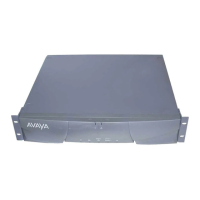Maintenance Commands
555-233-143
7-238 Issue 1 May 2002
ping
When debugging connectivity problems, a ping only indicates low-level
connectivity. If an external ping works but higher-level applications such as DCS,
CMS, or INTUITY do not, then you can only assume that there is connectivity to
the board. Interrogate the switch for other clues as to why the higher-level
application is not working.
The ping command has four qualifiers:
■ ‘‘ping ip-address’’
■ ‘‘ping node-name’’
■ ‘‘ping board’’
■ ‘‘ping packet-length’’
Table 7-36. ping command parameters
Action/
Object Qualifier Qualifier Description Permissions
1
1. You can place additional restrictions on the command by selecting the object “ip-address” on the Restricted
Object List:
a. Type change permissions loginid (an administered login such as inads), and press Enter.
b. Set the
Additional Restrictions field to y in the Administration Commands section of the form.
c. Go to the second or third page of the form.
d. Enter
ip-address in the list of Restricted Objects and press Enter.
Default
Feature
Interaction
ping ip-address
addr
node-name
board
UUCSS
packet-
length len
repeat
repeat#
The IP address of the device to
ping in the following format:
www.xxx.yyy.zzz
Administered node name (use
display node-names)
The location of the C-LAN or
IP Medpro board circuit pack
(UUCSS)
Range: 64–1,500 bytes
1–100
Examples:
ping ip-address 192.68.3.26
ping ip-address 192.68.3.26
board 1C05
ping ip-address 168.24.3.66
packet-length 1500
init
inads
craft
customer
packet
length
= 64
bytes
source
port-id
The ping source can be a
virtual endpoint port ID.
Examples:
ping ip-address 192.68.3.26
source S00015

